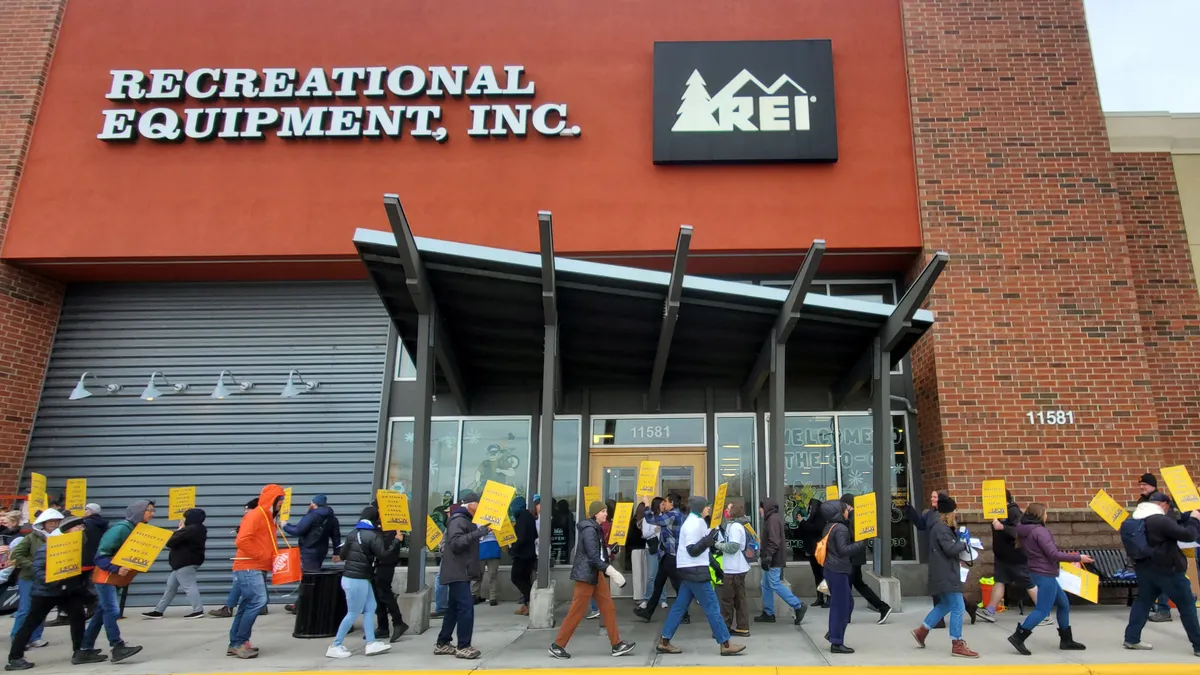Dive Brief:
-
REI workers affiliated with the United Food and Commercial Workers International Union and the Retail, Wholesale and Department Store Union this week filed 80 unfair labor practice charges against the outdoor retailer.
-
Workers from all eight unionized REI locations filed charges with their regional NLRB offices, according to a joint press release from the unions. The move follows a formal complaint to the National Labor Relations Board and walkouts by REI store workers in October.
-
“REI disagrees with the union’s contentions and will continue to fight their allegations,” REI Spokesperson Natalie Stotss said in an emailed statement. “We are committed and engaged in good-faith bargaining with stores that have chosen union representation and will continue to participate fully in the negotiating process.”
Dive Insight:
As many of its store workers have increasingly moved to unionize, REI has attempted a delicate position — endorsing the idea of unions while floating the notion that unions would interfere with its relationship with employees.
This led to statements last year from CEO Eric Artz that echoed rhetoric from a company with a less progressive reputation — Amazon.
“We don’t think unions are the best answer for our employees,” Amazon Spokesperson Barbara Agrait said in a statement to Retail Dive last year. “We don’t think that introducing a union is the right thing for our employees,” Artz said in his own statement around the same time.
REI has gone so far as to hire law firm Morgan Lewis, known for its work against union efforts on behalf of Amazon and other employers, according to Graham Gale, a shop mechanic at a unionized REI store in New York City. REI confirmed that Morgan Lewis is among several firms retained “to advise the co-op on legal matters.”
The last round of unfair labor practice claims come about a week before REI’s now-famous “Opt Outside” campaign. Stores and the website close for Black Friday to encourage workers and customers alike to spend time outdoors rather than shopping — an anti-capitalist message that has burnished the company’s progressive reputation for the last eight years. Workers are paid for the day off.
Its union stance is likely to tarnish that, experts say. These days, retailers are responsible not just for providing customer value, but also for participation in their communities, including treating employees well, according to Barbara Kahn, professor of marketing at The Wharton School.
“If a retailer gets this kind of press, of labor violations, consumers will react negatively if the claims seem justified. We’ve seen pushback against other retailers on these kinds of labor issues – for example against Walmart and Amazon,” Kahn said by email. “It would certainly seem likely, if there is pushback against these retailers, there would be pushback against REI.”
In statements emailed to reporters, several store workers said it is now they who are upholding REI’s values.
“Current leadership has abandoned the vision of the founders who truly lived REI’s progressive values and love for the outdoors,” said Clare Davis, a bike and snow shop senior mechanic at the Berkeley, California, REI. “The workers at REI are keeping that vision alive with our hard work, expertise, community service, and yes, by forming a union.”
In today’s environment, consumers pay more attention to how a company’s behavior squares with its own stated values, and theirs, so REI’s actions are likely getting close scrutiny, according to Melanie Maimon, a professor of psychology at Bryant University. REI is structured as a co-op, so that many of its customers are members. Those who expect REI to be more cooperative with the unions may feel confused and even isolated from the brand, said Maimon, whose research includes the study of consumer behavior.
In its statement to Retail Dive, REI bypassed questions about whether it’s worried that the union activity could harm its reputation as a progressive company.
“I would not be surprised if REI does see some changes in their consumer base,” Maimon said by phone. “And I think that REI will need to do a lot of things to gain trust back from those consumers. There's a trust-related issue there.”
Unfortunately for REI, any negative press reports, social media buzz or customer reaction are likely to loom larger than more favorable impressions, according to Maimon.
“People tend to have a negativity bias — we pay more attention to things, they stick in our memory more, when things are more negative,” she said. “So they could do 10 things right. But if they do one really big thing wrong, people are going to remember that one really big thing. You do have to then take a lot more steps to repair that damage.”














